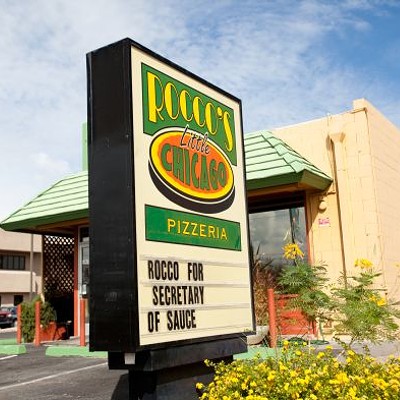Today, however, the Hermitage Cat Shelter is hardly the idyll of humanitarian impulse imagined by a Russian Orthodox nun who moved it here in 1969. Over the past year, the shelter's staff members have either been fired or have left in anger. Lawsuits are flying, and charges have been filed. The Hermitage board of directors now holds its meetings in secret. And this summer, Arizona's first no-kill cat shelter euthanized roughly 50 cats.
Not surprisingly, many observers believe the Hermitage has lost its way. "They certainly can no longer call themselves no-kill," says Susan Scherl, executive director of Tucson's HOPE Animal Shelter. Scherl points out that HOPE routinely treats cats with diseases blamed for the Hermitage euthanizations, such as stomatitis (mouth inflammation), asthma and cystitis. "Certainly, I have cats here with stomatitis," she says, "and they're doing fine."
Eyebrows were also raised when, at some point over the last few years, the Hermitage quietly dropped "No-Kill" from its name.
Today, Hermitage executive director Mary Jo Spring stands in the shelter's hushed side room. Nearby, a cat zips deftly across the floor, despite dragging its deadened hindquarters behind. According to Spring, this determined little feline embodies the mission of Sister Seraphim, who founded the Hermitage so many years ago. "In a lot of shelters," she says, "special-needs kitties like this would be euthanized."
But not here. "We are a shelter, and we will remain a shelter," she says. "We are just putting more emphasis on adoptions."
She claims to be resurrecting the Hermitage after a long, chaotic period of decline. Spring says that when she joined the shelter two years ago, the cats' medical needs were being neglected; maintenance was shoddy; and staffers were more interested in hoarding animals than finding them homes.
"I was the shelter's first executive director, and the staff had basically been running things," she says, adding that many long-timers bridled under her authority. Insubordination soon led to several firings.
This might seem like a typical episode of resistance to change--but underlying the shelter's tumult is an ugly mire of infighting, dating back to Spring's hiring. It reached a crescendo in May of this year, when she fired the shelter's veteran cat-care director and terminated a 14-year relationship with veterinarian Tim Ireland.
In July, Spring filed a complaint with the Arizona State Veterinary Medical Examining Board against Ireland and Dr. Jody Moffett, another veterinarian who'd briefly cared for the animals. According to these complaints, as summarized by the board, both doctors were negligent "in not reporting abuse and neglect and not recommending euthanasia of suffering cats."
By October, the state had dismissed those complaints. But questions lingered. For instance, why were purportedly dismal conditions allowed to persist for more than a year after Spring had taken charge?
"Had I known these things, I would have handled it differently," says the director, a professional fundraiser who came to the Hermitage with no prior shelter experience. "I guess ignorance is bliss. I really felt that our animals were being cared for, and I didn't know what to look for."
In June, the Hermitage contracted with the Humane Society of Southern Arizona for Dr. Karter Neal, the Humane Society's medical director, to begin caring for its animals, at a monthly cost of about $4,000.
Neal says shelter staffers "had never led Mary Jo to assume that there was a problem with the cat care at the Hermitage. Obviously, I had a different opinion when I walked into it."
It was Neal who decided that some of the animals should be killed. In a report to the state board, she wrote that the Hermitage housed approximately 270 cats, including 100 ferals, that it was "filthy," and that the staff "was hoarding animals under the guise of a no-kill shelter."
During a later interview with the Weekly, Neal described finding "cats in renal failure (and) cats that had cancer that nobody knew about. The whole situation was really out of control."
But former staffer Katy Heck calls that baloney. "I don't know how anyone could think that those cats weren't well taken care of," she says. "We had a staff of 20 people there, and about 70 volunteers. The shelter was open to the public, so there were constantly people coming through. If there was a hoarding situation, or if an animal was not receiving proper care, there would have been many eyes to notice that something was wrong."
Heck is among those currently being sued by the shelter, in a case revolving around blogs sharply critical of current shelter management. Some blogs appeared on a Web site maintained by a group called Save the Hermitage Coalition.
Other former volunteers and employees contend that blame for the shelter's upheaval goes far beyond Mary Jo Spring. "I think this all started with the board of directors," says one, who asked not to be named. "When there were problems, we would go and try to talk to them, which was almost an impossible thing. You needed to follow the regular methods of talking to somebody on the board, but even that didn't work. So you would put something in writing, make a phone call (or) send a letter to be allowed to speak."
Finally, the nonprofit's leadership even began holding its meetings behind closed doors, a change board president Tom Tulowitzki says will continue for the foreseeable future. "That move was taken because of the confidential information that was being essentially stolen--financial information, comments made by board members, things like that."
As the battle rages, Heck and other detractors suggest that Neal euthanized so many cats simply because they were feral or otherwise unadoptable. Neal vigorously disputes that claim.
Dr. Ireland, who spent so many years providing cut-rate services for the shelter, has his own ideas about what went wrong.
"My take is that the Hermitage hired (Spring) to be a fundraiser, and decided they didn't need a caretaker for the cats," he says. "Then they one-by-one dismissed people, and that put even more of a strain on the care of the animals. I don't think it was managed properly, and now they're passing the buck."












